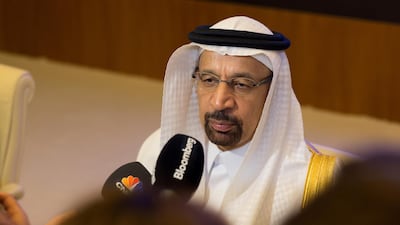It’s “inevitable” that Opec and its allies will agree to boost oil output gradually at their meeting in Vienna next week, said Saudi Arabia’s Energy Minister.
“As usual we will do the right thing,” Khalid Al Falih told reporters in Moscow on Thursday.
“I think we’ll come to an agreement that satisfies most importantly the market.”
Russia and Saudi Arabia, leaders of the deal between Opec and other major oil producers to curb output and boost prices, will discuss their next move in Moscow on Thursday on the same day as the two nations face off at the football World Cup.
Russian President Vladimir Putin and Saudi Crown Prince Mohammed bin Salman, along with Mr Al Falih and his Russian counterpart, will discuss how to boost oil production while maintaining their petro-alliance and overcoming opposition to an increase from other Opec members.
Both nations have proposed plans for the so-called Opec+ group that would add as much as 1 million barrels per day, about 1 per cent of global output, although Riyadh prefers a smaller increase, according to people familiar with the matter.
“I think it will be a reasonable and moderate agreement,” Mr Al Falih said. “It’s not going to be anything outlandish.”
_______________
Read more:
Russia a growing force in region but careful approach needed
Two dominant factors to influence oil markets this year
_______________
Brent futures for August settlement traded at $76.49 a barrel on the London-based ICE Futures Europe exchange on Thursday, down 25 cents. The contract advanced 86 cents on Wednesday. The global benchmark crude traded at a $9.88 premium to WTI for the same month.
West Texas Intermediate crude for July delivery traded at $66.77 a barrel on the New York Mercantile Exchange, up 13 cents, at 10.58am London time. The contract climbed 28 cents to $66.64 on Wednesday. Total volume traded Thursday was about 24 per cent below the 100-day average.
Futures rose 0.8 per cent to 468.1 yuan a barrel in afternoon trading on the Shanghai International Energy Exchange. The contract slipped 1.6 per cent on Wednesday.
Saudi Arabia is mulling various different scenarios to raise supplies. One proposal envisages a single hike of just 500,000bpd. Another would see an immediate increase of 500,000bpd followed by a similar addition in the fourth quarter. The kingdom has also shared ideas that float an increase of about 600,000 to 700,000bpd.
In the US, the crude stockpile decline was steeper than estimated by analysts in a Bloomberg survey, and also ran counter to an industry report a day earlier showing an increase. Petrol and distillates also slid last week, the Energy Information Administration said. Meanwhile, US crude production rose to 10.9m bpd, topping 10 million per day every week since early February.
Crude loadings at Libya’s biggest oil port of Es Sider and nearby terminal of Ras Lanuf halted after workers were evacuated following clashes, people familiar with the matter said.

